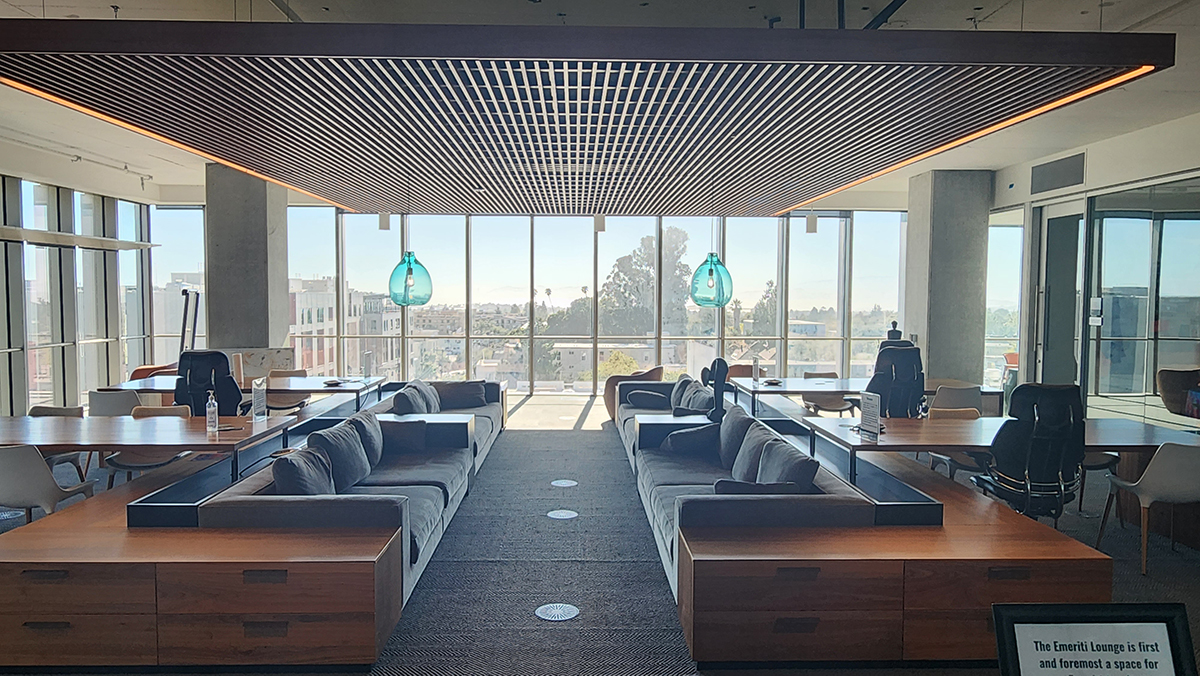10 Years Later: Looking back at Dean Patricia Buffler’s legacy
- 5 min. read ▪ Published
A warm demeanor. An enduring smile. A great sense of humor. These are traits that former colleagues and friends mention most when reflecting on the tenure of former UC Berkeley School of Public Health dean and internationally esteemed epidemiologist Patricia Buffler, ten years after her untimely death.
“Pat had a way of bringing people together in a positive way, inspiring people to do things, rather than a top-down approach,” said her former colleague Professor Arthur Reingold, who chaired the school’s division of epidemiology for over 20 years.
The school celebrated Buffler’s legacy in October 2023, with a reception hosted by her family to dedicate the school’s Emeriti Lounge, now named the Patricia A. Buffler Emeriti Lounge. The event also recognized the 200 plus family, friends, and colleagues who contributed to the Pat Buffler Memorial Fund. These funds were used to name and furnish this beautiful space overlooking Berkeley, Oakland, San Francisco, and the San Francisco Bay. The Buffler Family contributed the artwork displayed in the lounge, including four sculptures and original paintings from around the world. The event was full of smiles, laughs, and fond memories.
“The thing [I] loved about Pat was her positivity,” said Dean Emeritus Stephen Shortell, who was recruited to the school by Buffler in 1998, at the event. “She was a big thinker and doer. She was so inspirational in that regard.”
When Buffler, then 75, unexpectedly died of a stroke while working in her office 10 years ago, it was a shock to everyone, and an immense loss to the Berkeley community. Before her death, she had built an extensive career as a world-renowned researcher in childhood leukemia and environmental health alongside a reputation as a top-notch educator and beloved mentor.

The Patricia A. Buffler Emeriti Lounge
“Pat was a special person and I’ve missed her ever since her death,” Reingold said.
Born in Doylestown, Pennsylvania, Buffler was the first in her family to attend college, at The Catholic University in Washington, DC, where she received a degree in nursing and biology.
After a stint as a public health nurse in Harlem—she met her husband, Richard Buffler, on a blind date while living in New York—Buffler received her MPH and PhD in epidemiology at UC Berkeley.
After teaching at the University of Texas from 1974 to 1991, Buffler returned to Berkeley, where she spent 22 years as an epidemiology professor as well as holding the role of dean for seven years, from 1992 to 1998. Buffler was a forward-thinking dean who launched a number of new programs, including Health and Social Behavior and Public Health Nutrition. She also launched a bi-campus cancer epidemiology course in collaboration with UCSF. At the time of her death, she was president elect of the International Epidemiological Association.
“As a dean, she was instrumental in hiring a number of faculty in expanding the school and its reach nationally and internationally,” Reingold said.
As a researcher, Buffler’s most important work may have been her investigations into childhood leukemia and other childhood cancers. She launched the California Childhood Leukemia Study in 1995 to investigate the relationship between diet, genes, infections and environmental exposures and the development of leukemia. The study became one of the largest in the world. She also founded the Childhood Leukemia International Consortium and was principal investigator for the Center for Investigative Research on Childhood Leukemia.
She led research that concluded that sending your child to daycare might reduce the risk of getting leukemia, perhaps by bolstering the immune system through early exposure to common infections.
Soon after Buffler’s death, Reingold said, “No question she was one of the world’s leading researchers in childhood leukemia, but also in cancer epidemiology. It is standard now to look at the interaction of genetic determinants and environmental factors in disease, but Pat was one of the first people to apply it to leukemia. Because of her work, we now have a better understanding of a rare disease. Her loss is enormous.”
Buffler also fundamentally changed the way researchers thought about the environment and its interaction with cancers. This included her seminal research on secondhand tobacco smoke.
According to The Wall Street Journal, in 2002 Buffler said her research team looked at more than 40 studies on lung cancer and determined that nonsmokers who breathe second-hand smoke have a 20% greater risk of developing lung cancer. “Buffler said the panel estimated about a billion people would die of tobacco-related diseases world-wide this century,” the Journal reported.
She was a pioneering force as an instructor, too, bringing passion to the classroom. Introduction to Epidemiology, a course she taught in the spring semester, was popular among students because of her willingness to listen and learn from her students.
And Buffler was beloved by colleagues for the enthusiasm she threw behind mentoring. Buffler helped guide grant development for junior faculty and hosted well-received lunches for women faculty in her department.
“Pat significantly and positively influenced my 30+ year career through her demonstrated excellence in teaching/mentoring, research and service,” said Professor Lisa Barcellos. “More than any other mentor I have worked with! She made a real difference in my life.”